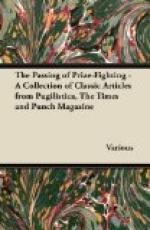6.
Because the candidate directed to him—“Esq.”
3rd. He whose principles are PHILOSOPHICAL, which may be
considered as
1st. He that is IMPARTIAL, as
1. He that voteth on both sides.
2. Because he tossed up with himself.
3. He who loveth the majority and therefore voteth for him who
hath most votes.
4. Because he is asked to vote one way, and so voteth the
other, to show that he is not influenced.
5. Because he hateth the multitude, and so voteth against the
popular candidate.
2nd. He that is INDEPENDENT, as
1. He who cannot be trusted.
2. He who taketh money from one side, and voteth on the other.
3. He who is not worth bribing.
4. He who voteth against his own opinion, because his letter
was not answered.
5. He who, being promised a place last election, was deceived,
and the like.
2nd. He that voteth ACCIDENTALLY, which is divisible into
1st. He that voteth through the BLUNDERS OF HIMSELF, which may be
considered as
1. He who is drunk, and forgetteth who gave him the bribe.
2. He who goeth to the wrong agent, who leadeth him astray.
3. He who is confused and giveth the wrong name.
4. He who is bashful, and assenteth to any name suggested.
5. He who promiseth both parties, and voteth for all the candidates,
and the like.
2nd. He that voteth through the BLUNDERS OF OTHERS, which may be
considered as
1. He who is mistaken for his servant when he is canvassed, and so
incensed into voting the opposite way.
2. He who is attempted to be bribed before many people, and so
outraged into honesty.
3. He who hath too much court paid by the canvasser to his wife, and
so, out of jealousy, voteth for the opposite candidate.
4. He who is called down from dinner to be canvassed, and being
enraged thereat, voteth against his conviction.
5. He who bringeth the fourth seat in a hackney-coach to him who
keepeth a carriage and the like.
3rd. He whose principles are PHILOSOPHICAL, which may be
considered as
1st. He that is IMPARTIAL, as
1. He that voteth on both sides.
2. Because he tossed up with himself.
3. He who loveth the majority and therefore voteth for him who
hath most votes.
4. Because he is asked to vote one way, and so voteth the
other, to show that he is not influenced.
5. Because he hateth the multitude, and so voteth against the
popular candidate.
2nd. He that is INDEPENDENT, as
1. He who cannot be trusted.
2. He who taketh money from one side, and voteth on the other.
3. He who is not worth bribing.
4. He who voteth against his own opinion, because his letter
was not answered.
5. He who, being promised a place last election, was deceived,
and the like.
2nd. He that voteth ACCIDENTALLY, which is divisible into
1st. He that voteth through the BLUNDERS OF HIMSELF, which may be
considered as
1. He who is drunk, and forgetteth who gave him the bribe.
2. He who goeth to the wrong agent, who leadeth him astray.
3. He who is confused and giveth the wrong name.
4. He who is bashful, and assenteth to any name suggested.
5. He who promiseth both parties, and voteth for all the candidates,
and the like.
2nd. He that voteth through the BLUNDERS OF OTHERS, which may be
considered as
1. He who is mistaken for his servant when he is canvassed, and so
incensed into voting the opposite way.
2. He who is attempted to be bribed before many people, and so
outraged into honesty.
3. He who hath too much court paid by the canvasser to his wife, and
so, out of jealousy, voteth for the opposite candidate.
4. He who is called down from dinner to be canvassed, and being
enraged thereat, voteth against his conviction.
5. He who bringeth the fourth seat in a hackney-coach to him who
keepeth a carriage and the like.
* * * * *
THE PROFESSIONAL SINGER
Have any of PUNCH’S readers ever met one of the above genus—or rather, have they not? They must; for the race is imbued with the most persevering hic et ubique powers. Like the old mole, these Truepennies “work i’ th’ dark:” at the Theatres, the Opera, the Coal Hole, the Cider Cellars, and the whole of the Grecian, Roman, British, Cambrian, Eagle, Lion, Apollo, Domestic, Foreign, Zoological, and Mythological




